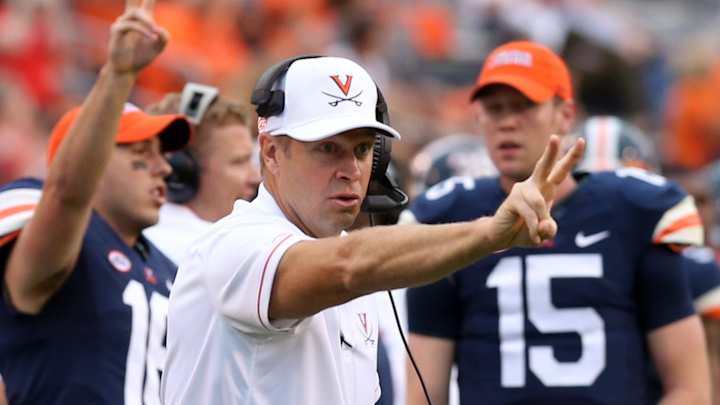There's no 'D' in ACC, fast-paced offenses dominating league

The continuing evolution of spread and no-huddle offenses in college football is changing the way some coaches measure defensive success.
That's a good thing for the ACC. Already this season, there have been eight games involving at least one Atlantic Coast Conference team in which the winning team gave up at least 30 points.
Pittsburgh (2-2, 0-1 ACC) has played in three straight games with scores in the 30s and 40s, all against Power Five programs. The Panthers beat Penn State 42-39 , then lost 45-38 at Oklahoma State and 37-36 last weekend at North Carolina. Panthers coach Pat Narduzzi said rule changes have made playing defense more challenging.
''It's been like that for a couple of years and it continues to roll,'' said Narduzzi, a long-time defensive coordinator. ''It is what it is. We have to adjust and move with it. ... Every team that we've faced this year has been no-huddle and moves quickly. ... I was happier with what we did defensively (against UNC) compared to last week'' against Oklahoma State.
Pitt allowed 640 yards against the Cowboys, but just 471 against the Tar Heels.
One rule change that permits offensive lineman to go further downfield also allows teams to disguise their intentions longer.
''Defense is very difficult anyway, knowing it is reactionary and you have to identify specific cues to determine run or pass,'' said Virginia coach Bronco Mendenhall, who calls the Cavaliers' defensive signal. He said the longer offenses - especially those with dual-threat quarterbacks - have to make that run or pass decision, the harder they are to stop.
''I don't think the rule is good for college football, but it is good for entertainment,'' Mendenhall said. ''If viewership is up, I'm sure the rule will stay the same. If viewership is down, then there will be possibly another rule. But the nature of the offense is based on rule change, and has now made it to where it's quite difficult.''
Mendenhall is a big believer in using statistics to assess his team's play, but the numbers he uses have changed.
''Yards and points per play matter a lot because so many teams are going fast. Total defense, not so relevant, and scoring defense,'' Mendenhall said, adding that the faster pace of most games naturally inflates total defense numbers.
That's how Narduzzi, a former defensive coordinator at Cincinnati and Michigan State, and coach Paul Johnson at Georgia Tech see it, too.
At Cincinnati and Michigan State, Narduzzi said, ''Our goal defensively was to limit the other team to 13 points per game. Today, that just isn't going to happen.''
The Yellow Jackets (3-1, 1-1) used to put up for some of the gaudiest offensive numbers in the league. This year, their 24.2 points a game ranks 13th in the league.
''I think what happens is when you look at scores, scores just in themselves can be very deceiving,'' Johnson said. ''You take Syracuse, who tries to play 800 mph. For them to be in a 24-17 game would be like us being in a 7-3 game because they're getting three times the possessions and their defense is also getting three times as many. Common sense would tell you if I play a game and I get 15 to 18 possessions I'm going to score more than if I get nine to 12.''
The ACC has seven teams averaging at least 36 points, and eight averaging at least 450 yards.
Third-ranked Louisville (4-0), with dual-threat quarterback sensation Lamar Jackson already having accounted for 25 touchdowns (13 passing, 12 running), somewhat skews the numbers. The Cardinals are averaging 63.5 points and 682 yards, both tops in the country. Against Syracuse, Louisville rolled up 845 yards in a 62-28 victory.
The Cardinals will visit No. 5 Clemson on Saturday in a highly anticipated showdown. The Tigers rank third nationally in total defense, allowing just 218.5 yards, but have put those numbers together against a schedule that includes offensively challenged Auburn, Troy, South Carolina State and Georgia Tech.
Saturday's ACC showcase could be another high-scoring affair with defenses trying to contain Jackson and Clemson's Deshaun Watson.
And if it is, it won't be the last. North Carolina defensive coordinator Gene Chizik said defenses are going to be playing catch up for some time.
''I don't think there's any question of that,'' Chizik said. ''There's very potent offenses in this league. I mean, that's just the way it is.''
---
AP sports writers Will Graves in Pittsburgh, Charles Odum in Atlanta and Aaron Beard in Chapel Hill, North Carolina contributed to this report.
---
Online: The AP's college football page: http://collegefootball.ap.org
---
Follow Hank on Twitter: www.twitter.com/hankkurzjr
